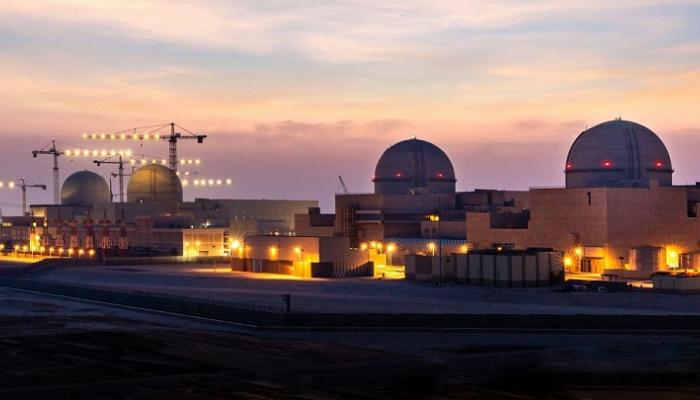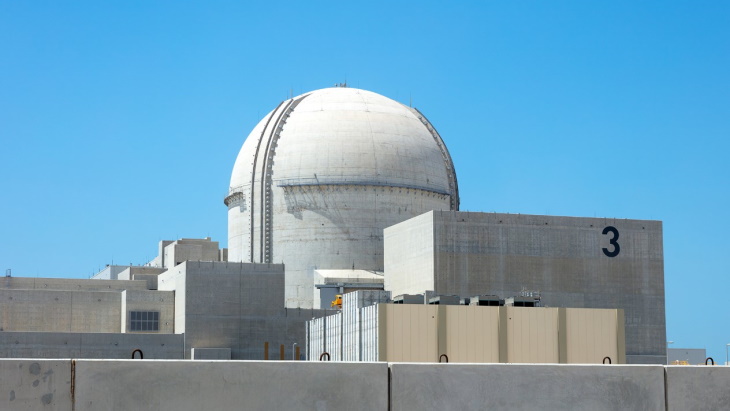The hot functional testing of the fourth and the final unit at the Barakah nuclear power plant in the UAE have been completed. This was announced by the Emirates Nuclear Energy Corporation (ENEC) adding that the Korean-designed APR-1400 reactor unit is scheduled to start operating next year.
Noteworthy, the hot functional tests simulate the temperatures and pressures that the reactor systems will be subjected to during normal operation. They are normally carried out before loading nuclear fuel and involve increasing the temperature of the reactor coolant system. In addition, they involve carrying out comprehensive tests to ensure that nuclear islands and conventional equipment and systems meet design requirements.
Findings after the hot functional and previous tests carried out on the Barakah 4
In a statement, ENEC said that this significant pre-operational test represents an important step forward in the testing phase of unit 4 of the plant. The results according to the company demonstrate that all systems perform in accordance with the highest quality and safety standards under normal operating conditions.
“Most notably,” the company said, “the pressurizer safety valve test, pre-core reactor coolant system flow measurement test, and main turbine system test were performed. These proved that major components and systems work as designed and they also meet all requirements for normal operation.”
Prior to conducting the hot functional tests, ENEC completed the structural integrity test and the integrated leak rate test at the 4th and final unit at Barakah nuclear power plant. “The successful completion of these tests,” the company said “demonstrates the integrity and robustness of the building structure. We are speaking in terms of force, and the structure’s ability to perform safely under normal and extraordinary circumstances.”
Project Overview
Developed jointly by Emirates Nuclear Energy Corporation (ENEC) and Korea Electric Power Corporation (KEPCO) in the Dhafra Region of Abu Dhabi, Barakah nuclear power plant is the first nuclear power station in the United Arab Emirates and in the Arabian Peninsula and the first commercial nuclear power station in the Arab World.
It consists of four Advanced Power Reactor (APR)-1400 nuclear reactors, two of which are already complete and operating and the rest at an advanced stage of completion. The Barakah nuclear power plant’s total capacity is 5380 MW, which is intended to supply up to 25% of UAE’s energy needs.
Nawah Energy Company, a joint venture established between ENEC and KEPCO back in 2016, is responsible for the operation and maintenance of the NPP.
Barakah nuclear power plant project team
A Korea Hydro and Nuclear Power (KHNP), Hyundai, Samsung, Doosan, Korea Power Engineering Company (KOPEC), Korea Nuclear Fuel (KNF), and Korea Plant Service and Engineering (KPS) consortium are responsible for the design, construction, and operation of the NPP.

KHNP is also in charge of the operating support services and cooperative businesses, while KEPCO Engineering and Construction (KEPCO E&C) is the subcontract providing plant design, architecture, and engineering works. Doosan on the other hand was entrusted with the construction and management of the nuclear steam supply system (NSSS), steam generator, and other related components.
Hyundai and Samsung are responsible for the civil engineering works, while Westinghouse Electric Corporation is providing technical assistance and license-related works. KNF will supply nuclear fuel, which will be maintained by KPS.
Hilal Bil Badi and Partners Contracting (HILALCO), was contracted to develop critical water intake structures that will provide cooling water for the turbine condensers and heat exchangers in the turbine generator building. Bechtel provided design and project management support services to KEPCO E&C.
Other firms involved with the project include Emirates Steel, National Cement, Dubai Cable Company, National Marine Dredging Company, and Western Bainoona Group.
Project Timeline
2011
The official groundbreaking ceremony for the Barakah nuclear power plant project was held in March.
2012
Construction of the first unit began in July, ahead of its scheduled date late that year, with the laying of the first nuclear safety concrete.
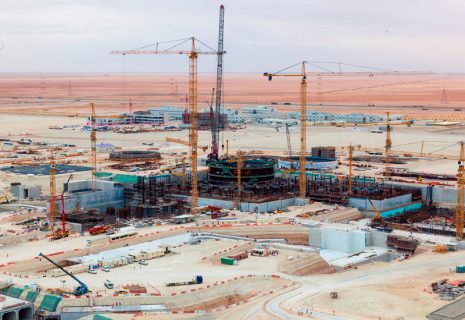
2013
Construction of unit 2 began in May.
2014
ENEC installed the condenser for unit 1 in February and the first reactor vessel (RV) in May of the same year.
In September, the construction of unit 3 began.
2015
In January, the construction of the RCB concrete dome for unit 1 was completed.
The first concrete pouring for unit 4 took place in September.
2016
Financial closure for the US$ 24.4bn nuclear power plant project was achieved in October. Noteworthy, the project is being financed through 80% debt and 20% equity. The debt financing comprises a US$ 16.2bn direct loan from the Abu Dhabi government and a US$ 2.5bn loan facility from the Export-Import Bank of Korea (KEXIM).
2018
By November, the main concrete works and heavy lifting for units 2, 3, and 4 were completed.
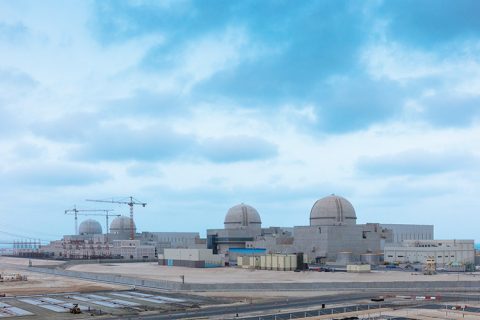
2020
Fuel loading into the first reactor unit was completed in March.
In the same month construction of units 2, 3, and 4 was reportedly in the final stages. Unit 2 was over 95% complete, unit 3 was over 91% complete and unit 4 was more than 83%.
May 2020
ENEC completes significant test for Unit 4 at Barakah Nuclear plant in Abu Dhabi, UAE
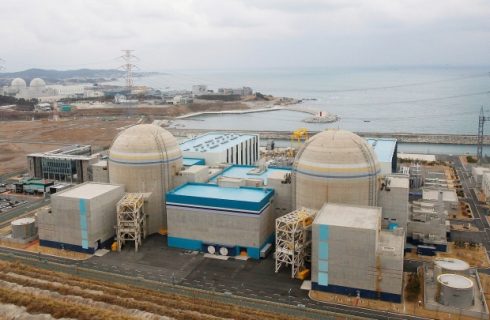
The Emirates Nuclear Energy Corporation (ENEC) has successfully completed Cold Hydrostatic Testing (CHT) at Unit 4 of the Barakah Nuclear Energy Plant, the Arab world’s first nuclear energy plant being built in the Al Dhafra region of Abu Dhabi, UAE. The testing incorporated the lessons learned from all previous three units and is a crucial step towards the completion of Unit 4, the final unit of the Barakah plant.
As a part of CHT, the pressure inside Unit 4’s systems was increased to 25% above what will be the normal operating pressure, demonstrating the quality and robust nature of the Unit’s construction. Prior to the commencement of CHT, Unit 4’s Nuclear Steam Supply Systems were flushed with demineralized water, and the Reactor Pressure Vessel Head and Reactor Coolant Pump Seals were installed. During the Cold Hydrostatic Testing, the welds, joints, pipes and components of the reactor coolant system and associated high-pressure systems were verified.
According to H.E. Mohamed Al Hammadi, Chief Executive Officer of ENEC, the continued progress being made at the Barakah nuclear plant despite the circumstances the world is facing in relation to COVID-19 is commendable. “The UAE leadership’s decisive and proactive response to the pandemic supported us in taking timely, safety-led actions to protect the health and safety of our workforce and our plant. These actions, alongside the efforts of our talented and dedicated workforce, have enabled the successful completion of CHT at Unit 4, which was completed in adherence to the highest standards of safety, quality, and security,” he said.
“He further added that, with this accomplishment, they move another step closer to achieving the goal of supplying up to a quarter of the nation’s electricity needs and powering its future growth with safe, reliable, and emissions-free electricity.
Also Read: UAE becomes first peaceful nuclear energy operating nation in the Arab world
UAE Peaceful Nuclear Energy Program
By the end of 2019, ENEC and Korea Electric Power Corporation (KEPCO) had successfully completed all major construction work including major concrete pouring, installation of the Turbine Generator, and the internal components of the Reactor Pressure Vessel (RPV) of Unit 4, which paved the way for the commencement of testing and commissioning.
The testing at Unit 4 represents a significant achievement in the development of the UAE Peaceful Nuclear Energy Program, following the successful completion of fuel assembly loading into Unit 1 in March 2020, confirming that the UAE has officially become peaceful nuclear energy operating nation. Preparations are now in the final stages for the safe start-up of Unit 1 in the coming months.
ENEC is currently in the final stages of construction for units 2, 3 and 4 of the Barakah Nuclear Energy Plant. The overall construction of the four units is more than 94% complete. Unit 4 is more than 84%, Unit 3 is more than 92% and Unit 2 is more than 95%. The four units at Barakah will generate up to 25% of the UAE’s electricity demand by producing 5,600 MW of clean baseload electricity, and preventing the release of 21 million tons of carbon emissions each year – the equivalent of removing 3.2 million cars off the roads annually.
UAE becomes the first peaceful nuclear energy operating nation in the Arab world
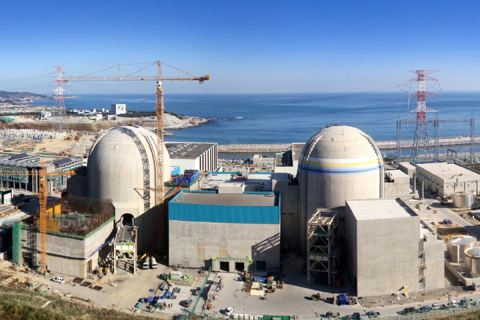
The Emirates Nuclear Energy Corporation (ENEC) recently announced that, following the successful completion of fuel assembly loading into Unit 1 of the Barakah Nuclear Energy Plant, the UAE has officially become peaceful nuclear energy operating nation. The Nation also becomes the first country in the Arab World to achieve this status, joining a limited group of countries worldwide that have successfully developed the intellectual and infrastructural capacity to use nuclear energy to generate safe, clean, and reliable baseload electricity.
The milestone was achieved, following the safe and quality-driven completion of the process to load fuel assemblies into the Unit 1 reactor, which commenced after the receipt of the Operating License from the UAE Federal Authority for Nuclear Regulation (FANR) in February.
“Our teams have been training over the years to safely progress towards providing the UAE with clean, reliable, and abundant electricity to power our economic and societal growth. Today, we are very proud as the UAE joins a limited group of nations who have achieved the global standards necessary to become peaceful nuclear operating nations,” said H.E. Eng. Mohamed Al Hammadi, Chief Executive Officer of ENEC. “We take this responsibility very seriously and our teams are safely and steadily transitioning through the sophisticated, highly-regulated process to advance Unit 1 towards full electrical generation capacity,” he added.
The fuel load was led by a team of highly-trained and FANR-certified fuel operators, with over 90% participation of Emirati experts who were previously trained in the APR-1400 technology in South Korea. This team led the transfer and load of the 241 fuel assemblies into Unit 1 which concluded earlier this week.
“The fact that the loading of the fuel assemblies has been achieved by a team with over 90% experienced and certified Emiratis is an important reflection that nuclear energy is an engine of growth for the UAE,” continued H.E. Al Hammadi. “Barakah is more than an energy plant, it brings prosperity and value to the UAE with new industrial and human capacity, it significantly improves the carbon footprint and energy security of the Nation, and accelerates the decarbonization of the power sector to contribute to alleviating global climate change,” he affirmed.
Also Read: Russia to assist in the provision of fuel for El-Debaa nuclear power plant in Egypt
Power Ascension Testing (PAT)
With the Fuel Load completed, the plant is now ready to begin the next stage and the UAE becomes the 33rd peaceful nuclear operating nation to achieve this status. The next step will be for the operating teams of Nawah, the operations and maintenance subsidiary of ENEC and the Korea Electric Power Corporation (KEPCO), to start operating the plant, in a process known as Power Ascension Testing (PAT), in which the systems of Unit 1 are safely and gradually tested to move into full electricity production. As per the Prime Contract signed between ENEC and KEPCO, this process is led by KEPCO and takes the lessons learned from the APR-1400 Korean fleet, which currently operates two APR-1400 units in South Korea at full capacity.
The PAT process is conducted in line with all regulatory requirements and the highest international standards of safety, quality, and security. Once the process is completed over the course of a number of months, the plant will begin delivering abundant baseload electricity to power the growth and prosperity of the UAE for decades to come.
Since its inception in 2009, ENEC has developed the UAE Peaceful Nuclear Energy Program in line with the principles set out in the 2008 UAE Policy on the Evaluation and Potential Development of Peaceful Nuclear Energy, for achieving the highest standards of safety, security, transparency, and non-proliferation.
Throughout every step, ENEC has delivered a program that has comprehensively met and exceeded these commitments across all critical areas, making the UAE a benchmark for nuclear projects in the region and for new build nations globally. To date, over 255 inspections have been undertaken by FANR to ensure the Barakah plant and its people and processes meet the highest standards of nuclear quality and safety. These national reviews have been supported by over 40 assessments and peer reviews by the International Atomic Energy Agency (IAEA) and the World Association of Nuclear Operators (WANO) to ensure alignment with international best practices in the nuclear industry.
Nawah Energy Company began the fuel load of Unit 1 following the successful receipt of the Operating License from the UAE’s independent nuclear energy regulator, FANR on 17 February 2020, and completion of the Pre Start-up Review (PSUR) by the World Association of Nuclear Operators (WANO) in January 2020. The receipt of the Operating License confirms that FANR is completely satisfied that the plant, people, programs, policies, and procedures meet their robust standards and that all voluntary reviews from the IAEA and WANO have been satisfied.
ENEC is currently in the final stages of construction for the remaining three units of the Barakah Nuclear Energy Plant in the Al Dhafra region of Abu Dhabi. The overall construction of the four units is more than 93% complete. Unit 4 is more than 83%, Unit 3 is more than 91% and Unit 2 is more than 95%The four units at Barakah will generate up to 25% of the UAE’s electricity demand by producing 5,600 MW of clean electricity, and preventing the release of 21 million tons of carbon emissions each year – the equivalent of removing 3.2 million cars off the roads annually.
July 2020
ENEC completes construction of Unit 2 of Barakah Nuclear Energy Plant
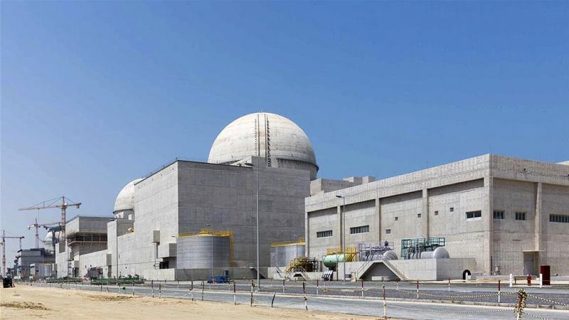
The Emirates Nuclear Energy Corporation (ENEC) has successfully completed the construction of Unit 2 of the Barakah Nuclear Energy Plant, the Arab World’s first nuclear energy plant located in the Al Dhafra region of Abu Dhabi. The unit has now been officially handed to Nawah Energy Company (Nawah), ENEC’s operating and maintenance subsidiary, for operational readiness activities.
With the achievement of this strategic milestone, Unit 2 has cleared its construction phase and the focus now shifts to completing the operational readiness preparations, testing, regulatory inspections, and international assessments required for Nawah to obtain the Operating Licence for Unit 2 from the UAE’s independent nuclear regulator, the Federal Authority for Nuclear Regulation (FANR).
This accomplishment was preceded by the successful completion of Hot Functional Testing (HFT) in August 2018, and the successful completion of Structural Integrity Testing (SIT) and Integrated Leak Rate Testing (ILRT) in March 2019. The advanced tests demonstrated Unit 2’s exemplary structural safety performance and ensured that its systems and components will reliably and safely perform their intended functions when operational.
Also Read: UAE becomes first peaceful nuclear energy operating nation in Arab world
Peaceful Nuclear Energy Program
According to H.E. Mohamed Al Hammadi, Chief Executive Officer of ENEC, the completion of Unit 2 construction activities in adherence to the highest international standards of safety, security and quality, and the handover of all systems to Nawah for commissioning are important milestones that reflect the dedication and skill of everyone involved in the UAE Peaceful Nuclear Energy Program. These achievements also highlight the benefits of building four identical reactors simultaneously, as the lessons learned during the construction of Unit 1 have contributed to the successful development of Units 2, 3, and 4 of the Barakah Plant.
“These milestones at Unit 2 are also a further testament to the vision and commitment of the UAE’s leadership in the transition to clean energy sources in the region, and our successful collaboration with KEPCO as our Prime Contractor and Joint Venture partner. The UAE Peaceful Nuclear Energy Program is an engine of social, academic, and economic growth for the nation, by enhancing our energy security, diversifying our economy, and creating high-value career opportunities for UAE Nationals. Today we are one step closer to securing a cleaner, brighter future for generations to come,” said H.E. Al Hammadi.
Unit 2 of the Barakah Plant has already successfully completed a number of individual and combined system tests, including Cold Hydrostatic Testing (CHT), the Structural Integrity Test (SIT), and Integrated Leak Rate Test (ILRT) as part of the first phase of its Initial Testing Program (ITP). The ITP aims to ensure that the Unit’s systems operate in accordance with the highest industry standards and will continue to do so during the operation of the plant over the coming decades.
Safe Start-up of Unit 1 of Barakah Nuclear Energy Plant successfully achieved
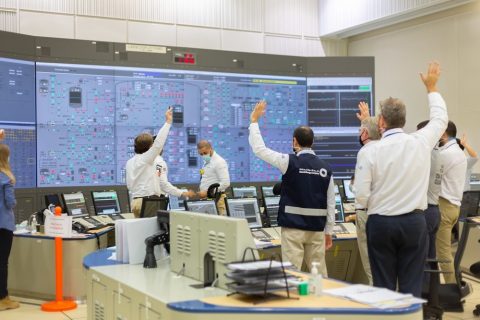
The Emirates Nuclear Energy Corporation (ENEC) has announced that its operating and maintenance subsidiary, Nawah Energy Company (Nawah) has successfully started up Unit 1 of the Barakah Nuclear Energy Plant, located in the Al Dhafrah region of Abu Dhabi, United Arab Emirates (UAE).
This step is the most historic milestone to date in the delivery of the UAE Peaceful Nuclear Energy Program, as part of the process toward generating clean electricity for the Nation for at least the next 60 years.
Since receipt of the Operating License from the Federal Authority for Nuclear Regulations (FANR) in February 2020, and the completion of fuel assembly loading in March 2020, Nawah, the Joint Venture nuclear operations and maintenance subsidiary of ENEC and the Korea Electric Power Corporation (KEPCO), has been safely progressing through a comprehensive testing program, prior to successfully completing the start-up of the first nuclear energy reactor of the Barakah plant.
Also Read: ENEC completes construction of Unit 2 of Barakah Nuclear Energy Plant
The start-up of Unit 1
The start-up of Unit 1 marks the first time that the reactor safely produces heat, which is used to create steam, turning a turbine to generate electricity. Nawah’s qualified and licensed team of nuclear operators focuses on safely controlling the process and controlling the power output of the reactor. After several weeks and conducting numerous safety tests, Unit 1 will be ready to connect to the UAE’s electricity grid, delivering the first megawatts of clean electricity to the homes and businesses of the Nation.
Testing has been undertaken with the continued oversight of the UAE’s independent nuclear regulator, FANR, and follows the World Association of Nuclear Operator’s (WANO) completion of a Pre Start-up Review (PSUR) in January 2020, prior to receipt of the Operating License, which ensures Unit 1 is aligned with international best practice in the nuclear energy industry.
Once the unit is connected to the grid, the nuclear operators will continue with a process of gradually raising the power levels, known as Power Ascension Testing (PAT). Throughout, the systems of Unit 1 are continuously monitored and tested as the unit proceeds towards full electricity production in line with all regulatory requirements and the highest international standards of safety, quality and security. Once the process is completed over the course of a number of months, the plant will deliver abundant baseload electricity at full capacity to power the growth and prosperity of the UAE for decades to come.
Aug 2020
Barakah Nuclear Energy Plant Unit 1 successfully connected to UAE’s transmission grid
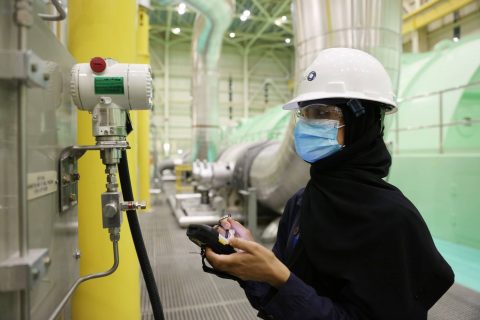
The Emirates Nuclear Energy Corporation (ENEC) has announced that its operations and maintenance subsidiary, Nawah Energy Company (Nawah), in partnership with the Abu Dhabi Transmission and Despatch Company (TRANSCO), a subsidiary of Abu Dhabi National Energy Company (TAQA), has safely and successfully connected Unit 1 of the Barakah Nuclear Energy Plant to the UAE grid, and is dispatching its first megawatts of clean electricity to the Nation.
During the process, the generator in Unit 1 was integrated and synchronized with the requirements of the UAE’s national electricity transmission grid. Unit 1 connection, also referred to as ‘grid synchronization’, marks the first time that clean electricity produced at the plant is delivered to the UAE national grid.
This follows the safe and successful start-up of Unit 1 at the end of July 2020 by Nawah. Since then, the operations team has run a series of tests, steadily increasing the power levels to ultimately generate the first megawatts of baseload electricity produced by the Barakah plant, located in the Al Dhafrah region of Abu Dhabi.
Also Read: Safe Start-up of Unit 1 of Barakah Nuclear Energy Plant successfully achieved
UAE Peaceful Nuclear Energy Program
With clean electricity from peaceful nuclear energy now being delivered to homes and businesses across the UAE, this milestone is a significant moment in the continued safe, secure, and quality-led delivery of the UAE Peaceful Nuclear Energy Program and its cornerstone, the Barakah Nuclear Energy Plant.
TRANSCO’s role in this effort is both critical and extensive, having constructed 952 kilometers of 400 kV overhead lines to connect the Barakah Nuclear Energy Plant Unit 1 to the Abu Dhabi electricity grid – ensuring the power generated at Barakah is safely, securely, and reliably delivered to consumers across the UAE.
With the integration and connection complete, Unit 1’s nuclear operators will begin the process of gradually raising the power levels, known as Power Ascension Testing (PAT). Throughout this process, the Unit 1 systems follow international best practices to safely progress and test the unit as it proceeds toward full electricity production.
Once the process is completed, Unit 1 will deliver, at full capacity, abundant baseload electricity to power the growth and prosperity of the UAE for decades to come. This testing will be conducted under the continued oversight of the UAE’s independent nuclear regulator, FANR, which has now conducted more than 280 inspections since the start of Barakah’s development. This is in addition to over 40 missions and assessments by the International Atomic Energy Agency (IAEA) and the World Association of Nuclear Operators (WANO).
ENEC recently announced the construction completion of Unit 2, with operational readiness preparations now underway by Nawah. Construction of Units 3 and 4 of the Barakah Nuclear Energy Plant are in their final stages, with Unit 3 being at 93% completion, Unit 4 at 86% completion, and the overall construction completion of the four units now standing at 94%.
Dec 2020
First nuclear reactor in UAE reaches full capacity

The first nuclear reactor in the UAE, Barakah unit 1 has been reported by the Emirates Nuclear Energy Corporation (ENEC) to have reached full capacity and is not generating 1400 MW of electricity. The Korean-designed unit operated by Nawah Energy Company is now the single largest power generator in the United Arab Emirates and is due to begin commercial operations in early 2021.
The APR-1400 nuclear reactor is one of the four reactors that are being constructed at the Barakah site in the Al Dhafra region of Abu Dhabi. Construction of the first unit of the first nuclear reactor to be built in the UAE began eight years ago and was completed in 2018.
Also Read: Construction proceeds at Turkey’s first nuclear plant
The reactor became operational in July of this year and was connected to the grid in August. The unit has been undergoing power ascension testing, under the oversight of the UAE’s national nuclear regulator, the Federal Authority for Nuclear Regulation. Several tests are now to be carried out by the Nawah Energy company before the unit is shut down in preparation for the “check outage”; this is when the unit’s systems will be examined, and any planned or corrective maintenance carried out, before the start of commercial operations.
The Barakah nuclear power plant is being built by a group of companies led by the Korea Electric Power Corporation. The second unit of the plant was completed in July of 2020, and units 3 and 4 are now 93% and 87% complete, respectively. When fully operational, the four-unit plant will provide around 25% of the entire kingdom’s electricity and prevent the release of up to 21 million tonnes of carbon emissions annually, according to reports by ENEC.
Emirates Nuclear Energy Corporation CEO Mohamed Al Hammadi stated that “unit 1 marks a new era for the power sector and the future of the clean carbon economy of the nation, with the largest source of electricity now being generated without any emissions.”
2021
In April, unit 1 of the NPP started commercial operations.
The second unit began supplying electricity to the country’s power grid in September of the same year. At the time units, 3 and 4 were in the final stages of commissioning at 95% and 91% completion, respectively, with the construction of the plant as a whole more than 96% complete.
In October 2021, Doosan Heavy Industries & Construction Co. signed a maintenance service deal for a reactor at the Barakah nuclear power plant.
Under the deal with Nawah Energy Co., the operator of the nuclear power plant, Doosan will conduct maintenance services for turbines, generators, and parts related to the nuclear reactor of the nuclear power plant for three months starting in April 2022.

A strategic drill kicked off in late October to maximize the preparedness of emergency response at the Barakah nuclear power plant.
The drill dubbed ConvEx-3 was organized by the International Atomic Energy Agency and would be implemented under the supervision of the UAE National Emergency Crisis and Disaster Management Authority (NCEMA), in accordance with legislative provisions of the UAE’s nuclear regulator, the Federal Authority for Nuclear Regulation (FANR).
The aim is to ensure UAE’s full preparedness and demonstrate its commitment to the highest international standards for safety, security, and transparency.
In early November, Emirates Nuclear Energy Corporation (ENEC) announced the completion of the construction of the third reactor at the Barakah Nuclear Energy Plant.
According to the ENEC, the unit was also handed over during the same time for operational readiness activities and was on track to start up and deliver clean electricity in the year 2023. The unit in question joins Unit 1, which is fully operational, and Unit 2, which is connected to the UAE national grid and undergoing testing.
December 2021
Unit 1 was commercially operational while Unit 2 was undergoing a testing phase in preparation for commercial operation and had at the time reached 50% power.
The Operating Licence Application for Unit 3, on the other hand where Emirates Nuclear Energy Corporation (ENEC) announced its construction completeness last month (November 2021) was being reviewed by the UAE’s Federal Authority for Nuclear Regulation (FANR) and it would be issued when all regulatory requirements were met.
March 2022
Unit 2 of Barakah Nuclear Energy Plant begins commercial operations
ENEC (The Emirates Nuclear Energy Corporation) recently announced the start of commercial operations of the second Unit 2 of the Barakah Nuclear Energy Plant. The new unit will contribute to the addition of well over 1,400 megawatts of electricity that contain zero-carbon emissions which will bring forth the total production of electricity produced by Units 1 and 2 to 2,800 megawatts.
This new milestone brings ENEC and all its subsidiaries closer to their halfway mark of being able to deliver on its commitment to supplying a quarter of the country’s electricity needs. In addition to supplying, the corporation also aims to supply electricity that is reliable on a 24/7 basis. Their efforts will also contribute to an improved economy by being able to generate, and supply electricity on a more consistent and efficient basis.
Also Read: Olkiluoto Nuclear Power Plant Unit 3 Project Updates, Finland
With the commencement of the Unit 2 Commercial Operations, the Barakah Nuclear Energy Plant is already the first multi-unit plant that is currently present in the Arab world. This in effect makes the region the leader of the largest decarbonization initiative, by being able to deliver thousands and thousands of megawatts of carbon-free electricity daily.
The CEO and Managing Director of ENEC, Mohamed Ibrahim Al Hammadi confidently expressed that the Barakah Nuclear Energy Plant is the United Arab Emirates’ powerhouse. The commencement of the new Unit 2 Commercial Operations will enable UAE’s power sector to stay on track ahead of their Net Zero 2050 goal.
The Strategic Initiative aims to prevent harmful carbon emissions from everyday life operations. Mohamed added that with Unit 2 already having started commercial operations less than 12 months after the commercial operations of Unit 1, the UAE has been able to demonstrate its megaproject capabilities.
Maintenance works of Unit 1 of Barakah Nuclear Power Plant begins
The Federal Authority for Nuclear Regulation (FANR) has announced the start of maintenance works of Unit 1 of the Barakah Nuclear Power Plant.
The works, which are inclusive of the regular nuclear refueling of the plant as well as testing of the equipment used for safety-related systems, and power production alongside others, are currently under the qualified hands of Nawah Energy Company. The latter is a subsidiary of Korea Electric Power Corporation (KEPCO) and Emirates Nuclear Energy Corporation which is also responsible for maintaining Units 1 down to 4 of the Barakah Nuclear Energy Plant.
The maintenance works of Unit 1 of Barakah Nuclear Power Plant are a result of FANR conducting its regulatory oversight activities to ensure that all activities are operating as required by FANR regulations. The authority has reportedly set in place new additions of nuclear fuel assemblies and several other maintenance activities.
Once the refueling phase has been completed, Unit 1 will return to being fully operational when they manage to obtain approval from FANR.
Jun 2022
Barakah Nuclear Power Plant Project in Abu Dhabi 97% Complete
Barakah nuclear power plant project is 97% complete according to Emirates Nuclear Energy Corporation (Enec). The first two units of the facility are commercially operational and produce electricity 24/7. The third unit on the other hand is ready to begin fuel loading, according to a statement issued by the country’s nuclear regulatory agency on June 19.
The Federal Authority for Nuclear Regulation (FANR) said it would send inspectors to oversee the process, in order “to ensure that the fuel load and testing processes are completed according to requirements.”
The FANR on June 17 granted Nawah Energy Co., a license to operate Unit 3 for 60 years. Nawah is the operations and maintenance division of Enec. According to Christer Viktorsson, FANR’s director-general, the licensing of Unit 3 means the plant’s operators can begin the commissioning phase to prepare for commercial operation.
FANR decision to issue the operating license is a culmination of efforts made by FANR since it received the Operating License Application from Nawah in 2017 for Units 3 and 4. The authority conducted the assessment of the application for Unit 3, following the issuance of the licenses for the previous two units, and adopted a systematic review process that included a thorough assessment of the application documentation, conducting robust regulatory oversight and inspections.
Commitment to the completion of the project
The project is being developed in the Al Dhafra region of Abu Dhabi in collaboration with Korea Electric Power Corporation (Kepco), the JV partner and prime contractor of the plant. Seung-il Cheong, the President, and CEO of Kepco reaffirmed his team’s commitment to completing the remaining units at Barakah in an efficient and high-quality manner. This he said would help realize the full value of the plant in terms of electricity generated and the significant carbon emissions the plant saves.
The Barakah plant is accelerating the decarburization of the power sector in the UAE and the Arab World, significantly contributing to achieving Net Zero by 2050.
